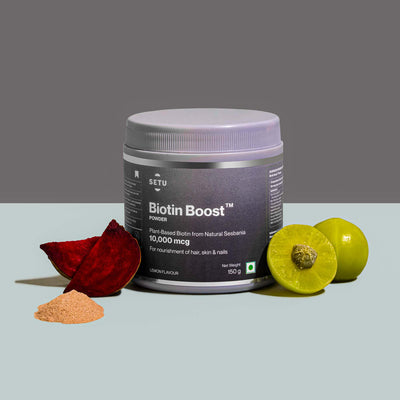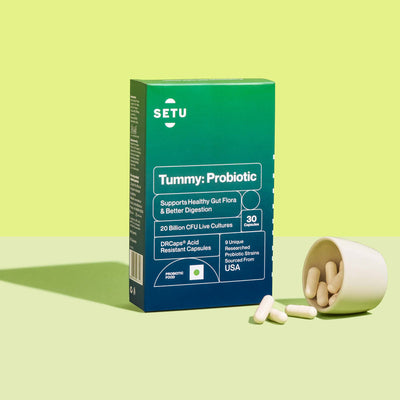How to get relief from stomach pain
06 Sep 2021
Stomach pains are tricky. Sometimes, they appear gradually, the pain going from mild to worse over time. At other times, however, they hit you with full force like a bolt from the blue.
No matter how stomach pains manifest, they can cause a lot of discomfort and hamper your day. Let’s take a look at what you can do to soothe a stomach ache, and why you might be experiencing it in the first place.
What is a stomach ache?
Any discomfort in the belly between the ribs and the pelvis is called stomach pain. It may not always be the stomach that hurts, but any organ in that area.
If the pain is one-off and the onset is quick, it’s called acute stomach pain; if the pain persists for months, it’s called chronic stomach pain. Your stomach pain might feel like a cramp, a throbbing or stabbing pain, or as if there are knots in your abdomen.
Tips to get relief from stomach pain
Here are some things you can do to get temporary relief. However, remember that it’s always better to seek professional help if your symptoms don’t abate.
Sip herbal teas: Sipping peppermint tea has been shown to provide relief from symptoms of stomach pain. The leaf has an antispasmodic effect and acts as a natural pain killer. Chamomile tea also has anti-inflammatory and sedative properties that help relieve pain.
Drink rice water: Don’t dump out the water after boiling your rice; drink it instead. Rice water or kanji contains probiotics and nutrients that aid your digestive system. It is good for relieving constipation and can prevent your body from getting dehydrated when you have a bout of diarrhoea.
Drink lemon or ginger juice: Lemons are rich in antioxidants and can provide your stomach with the acid it needs to boost digestion. You could make a diluted glass of lemon juice or sip some lemon tea to soothe an upset stomach. Ginger, on the other hand, has anti-inflammatory properties and can provide relief from nausea, indigestion and bloating.
Apply a heating pad: Heat relaxes muscles and can ease muscles spasms. Lie down and place a heating pad where your stomach is hurting. Do this for about 15 minutes.
Sleeping positions: Certain sleep positions can improve your digestion, reducing your chances of experiencing stomach pain. Using a wedge pillow elevates the upper half of your body and can prevent acid reflux.
Apple Cider Vinegar (ACV): Stomach acid is needed for a healthy digestive process. Stress and a poor diet can reduce the acid levels in your stomach. Setu’s Apple Cider Vinegar Gummies help raise these acid levels in your stomach and, in doing so, kills unhealthy bacteria.
Reasons for stomach pain
Now that we’ve looked at how you can get immediate relief from your stomach pain, let’s look at some the reasons why you might be experiencing a stomach ache.
Gastroenteritis: When the intestines get infected by viruses, bacteria or parasites, they get inflamed, causing severe stomach pain, vomiting, nausea and fever.
Acid reflux: This is a digestive disease where stomach acid or bile travels back into the oesophagus, irritating and inflaming it. Acid reflux is accompanied by symptoms like bloating, a burning sensation in your chest or a sour taste in your mouth, and stomach aches.
Constipation: When you are unable to pass stools and too much waste collects in your bowels, the pressure on your colon can increase, which causes pain.
Kidney stones: A kidney stone is a small, hard deposit that forms in the kidneys. When the stone is still in your kidney, you can experience a shooting pain in your side or back. As it travels into your urinary tract, the pain will shift to your lower abdomen.
Appendicitis: Appendicitis is a medical condition which results in the inflammation of the appendix. When inflamed, the appendix irritates the lining of the abdominal wall, causing pain.
Types of abdominal pain
All stomach pain does not feel the same. The pain could be generalised—felt across the abdomen—or restricted to a specific area. A cramp-like pain is a pain that comes and goes in fits and starts. You could also experience waves of pain – a colicky pain that appears suddenly and then stops just as abruptly.
Location of pain within the abdomen
A doctor will be able to diagnose the possible cause for your pain based on where it emanates from. Pain in the upper region of the stomach could be due to acid reflux or an ulcer. When you’re suffering from food poisoning, the pain will be across the stomach. Issues related to the gallbladder tend to cause pain in the right upper abdomen. Pain in the left lower abdomen could be due to complications related to the colon.
Diagnosis of stomach pain
A doctor will physically examine you and may ask you to carry out some routine tests before deciding on the appropriate treatment for stomach pain.
Medication will focus on providing you with relief from your stomach pain. You may also be prescribed antibiotics, laxatives, antacids and other medicines that treat the underlying cause of the pain.
Prevention
The best way to prevent stomach ailments is by being vigilant about your diet, personal hygiene and lifestyle. Drink plenty of water often, always eat your meals on time, and monitor portion sizes to avoid overindulging, especially in rich, fatty foods. Also try adding fibre-rich foods to your diet and avoid food that’s excessively spicy oily or unhygienic. Limit your stress by practicing yoga and meditation.
FAQs
1) What type of symptoms can be considered alarming?
If the pain feels too severe, don’t hesitate to seek medical attention. You should also keep an eye out for symptoms like bloody stools or vomit, difficulty breathing, and swelling around the abdomen. If you are pregnant, don’t wait for symptoms to progress to discuss any kind of discomfort with your doctor.
2) What are the types of tests that help diagnose the cause of stomach pain?
A doctor may ask you to do a stool, urine and blood test. An X-ray or an ultrasound may also be prescribed. Other tests include an endoscopy or colonoscopy.
3) How long does abdominal pain last?
Abdominal pain may be short or long-lasting; it depends on the underlying cause. The duration of pain is not related to the severity of the condition in any way. Pain may at times increase with movement or coughing.

Skin: Renew - Glutathione
- ₹1,694
- ₹1,694
-
₹2,200 -
You Save:
₹506 (23%)
Categories
- Choosing a selection results in a full page refresh.
- Press the space key then arrow keys to make a selection.
this is the sidecart










